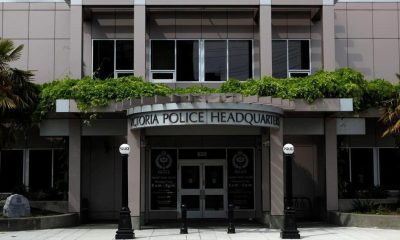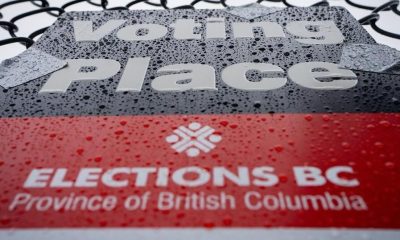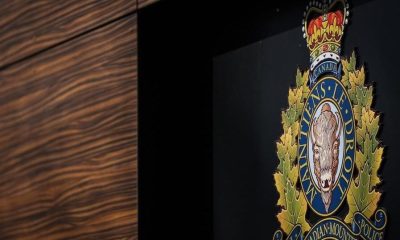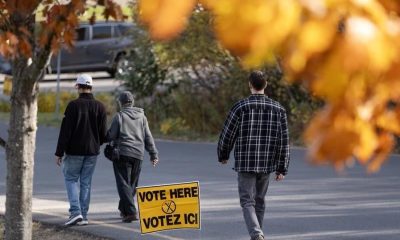Economy, taxes, crime and hockey pucks will be at the forefront of Danielle Smith’s mission to hold onto the premier’s office.
Politics
Danielle Smith kicks off 2023 UCP election campaign in Calgary
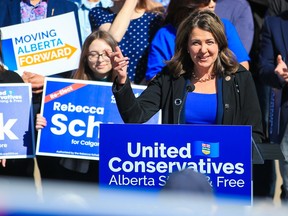
With the writ set to drop on Monday for a May 29th election, most pollsters have the UCP and NDP in a dead heat
This election stands to be much different than 2019 when the new conservative party rolled to a large majority mandate, securing 63 seats to the NDP’s 24.
Less than a year later and the province was shut down, along with the rest of Canada, dealing with a global pandemic and restrictions. The party also chewed through leader Jason Kenney last summer and Smith won the leadership race while the NDP had taken the lead in many polls.
With the writ set to drop on Monday for a May 29th election, most pollsters have the parties in a dead heat with Calgary viewed as the big battleground.

It was of little coincidence on Tuesday, the province stepped up with a $330-million promise to invest in the infrastructure surrounding the new event centre, so long as they are re-elected. Smith warned on Saturday that the NDP would kill the deal.
The province’s investment in the new home for the Flames has not flown well in other parts of Alberta, after there was no provincial funding for the Edmonton Oilers new arena which opened in 2016.
“This additional investment really does bring our capital investment up to a similar level as Edmonton,” she told Postmedia following the rally. “Over the three years in this year’s budget, we were investing just over $3 billion in capital for Edmonton just under $3 billion in capital for Calgary. And so this does bring that up to a very comparable level, even though Calgary does have a bigger population.”
The premier did not take questions from the media at the event.
Smith also promised to continue to take a hard stance on crime while addressing addictions.
The key focus of her six-minute-and-15-second speech, though, was the economy. She warned against the NDP’s history of raising taxes, which she claimed drove industry out of Alberta after their election in 2015. Smith boasted about the current economic success of the province, pointing to the latest oil boom, diversification through a thriving tech sector in Calgary as well as a rapidly growing film and television industry.
She also throttled on connecting the NDP and Rachel Notley to the federal NDP and Liberal parties.
The speech did not talk about the party’s plans for health care, education or the environment, though Schulz said they have made announcements in recent weeks as a government on these issues and more would be unfurled during the campaign.
“We’re really not big fans of Trudeau, we feel he’s really hurt Alberta since he’s been in power,” said Andrew Cruickshank. “They’re anti-oil and still take our $20 billion a year in transfer payments but they really don’t seem to respect Alberta, and that’s too bad. I wish they’d just give us an honest shake and let us sell our oil and gas.”

Mahmoud Mourra said he believed Smith was needed to “save the province” from Notley and another NDP government.
“In a short time (with) the UCP government under Danielle Smith I’ve seen a lot of improvement,” he said. “When Danielle Smith took the charge last October, I saw a lot of changes and I do believe this is for the betterment of our province and I believe the only one who could stand up to Trudeau will be Danielle Smith.”
Mourra brought his son Abraham with him to underscore the importance of politics and involvement and to hold strong to freedoms, which he says continue to be encroached upon. He noted many in the Muslim community are conservative, despite fear tactics played by the opposition.
For some, the speech fell a little flat.
“The speech that I heard today was a speech, for me, that lacked connection,” said Lowman Edwards, hoping to see her step forward more on sovereign rights.
Notley was scheduled to launch the NDP campaign in Edmonton at 5 p.m.

Politics
Here is the latest on the New Brunswick election
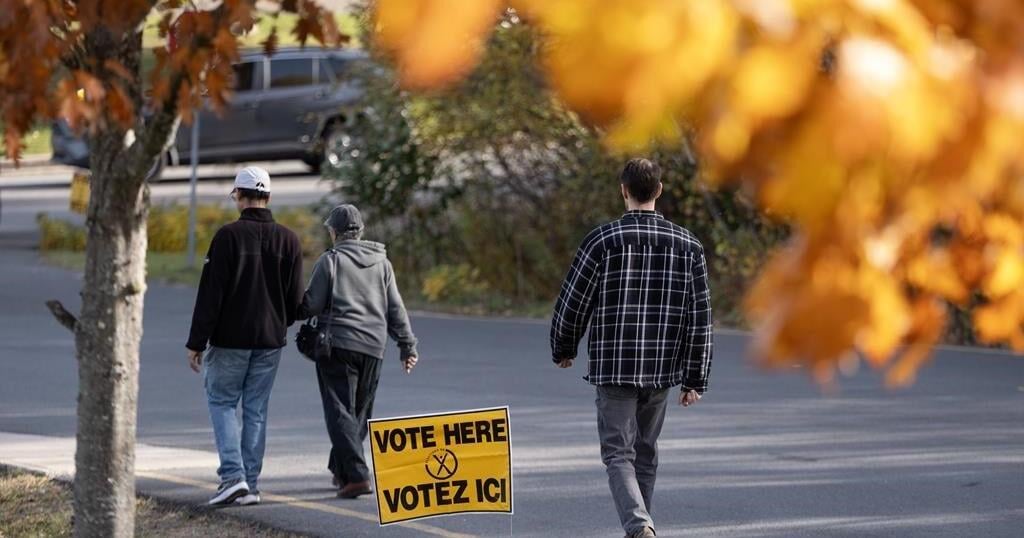
The New Brunswick Liberal Party has won a majority government, and Susan Holt will become the first woman to lead the province.
Here’s the latest from election night. All times are ADT.
10:15 p.m.
The results of the New Brunswick election are in, and with virtually all of the ballots counted, the Liberals won 31 seats out of 49.
The Progressive Conservatives won 16 seats.
The Green Party won two.
Voter turnout was about 66 per cent.
—
10 p.m.
Prime Minister Justin Trudeau has congratulated New Brunswick Liberal Leader Susan Holt for her party’s victory in the provincial election.
Trudeau says on the X platform he’s looking forward to working with Holt to build more homes, protect the country’s two official languages, and improve health care.
—
9:48 p.m.
During her victory speech tonight in Fredericton, New Brunswick premier-designate Susan Holt thanked all the women who came before her.
Holt will become the first woman to lead the province after her party won a majority government in the New Brunswick election.
The Liberals are elected or leading in 31 of 49 ridings.
—
9:30 p.m.
Blaine Higgs says he will begin a transition to replace him as leader of the Progressive Conservatives.
After being in power for six years, the Tories lost the election to the Liberals.
Higgs, who lost his seat of Quispamsis, says, “My leadership days are over.”
—
9:17 p.m.
The Canadian Press is projecting that Blaine Higgs, leader of the Progressive Conservative Party of New Brunswick since 2016, has lost in the riding of Quispamsis.
Higgs, 70, has been premier of New Brunswick since 2018, and was first elected to the legislature in 2010.
—
8:45 p.m.
When asked about the election results, Progressive Conservative chief of staff Paul D’Astous says that over the last 18 months the party has had to contend with a number of caucus members who disagreed with its policy.
D’Astous says the Tories have also had to own what happened over the last six years, since they came to power in 2018, adding that the voters have spoken.
—
8:39 p.m.
The Canadian Press is projecting that David Coon, leader of the New Brunswick Green Party, has won the riding of Fredericton Lincoln.
Coon, 67, has been leader of the party since 2014, the year he was first elected to the legislature.
—
8:36 p.m.
The Canadian Press is projecting that the New Brunswick Liberal Party has won a majority government in the provincial election.
Party leader Susan Holt will become the first woman premier in the province’s history.
—
8:20 p.m.
Early returns show a number of close races across the province, with the Liberals off to an early lead.
Liberal campaign manager Katie Davey says the results will show whether party leader Susan Holt, a relative newcomer, was able to capture the attention and trust of the people of New Brunswick.
Davey says she believes voters have welcomed Holt and her message, which focused on pocketbook issues, especially health care.
—
8 p.m.
Polls have closed.
Eyes will be on a number of key ridings including Fredericton South-Silverwood, where Liberal Leader Susan Holt is vying for a seat; Saint John Harbour, which has been competitive between the Tories and Liberals in recent elections; and Moncton East, a redrawn Tory-held riding that the Liberals have targeted.
At dissolution, the Conservatives held 25 seats in the 49-seat legislature. The Liberals held 16 seats, the Greens had three, there was one Independent and there were four vacancies.
This report by The Canadian Press was first published Oct. 21, 2024.
Politics
A look at Susan Holt, Liberal premier-designate of New Brunswick
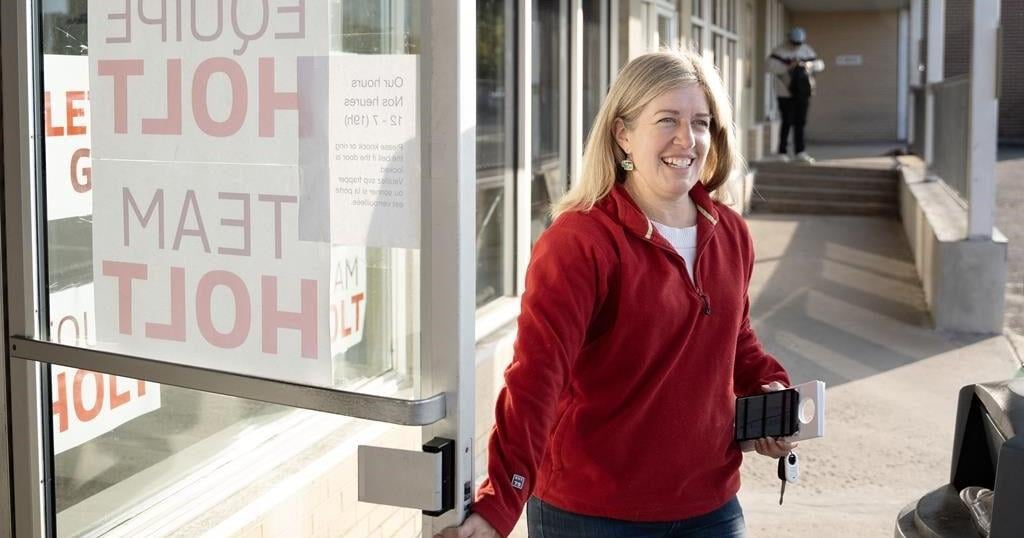
FREDERICTON – A look at Susan Holt, premier-designate and leader of the New Brunswick Liberal party.
Born: April 22, 1977.
Early years: Raised in Fredericton, she attended Queen’s University in Kingston, Ont., and then spent a year in Toronto before moving abroad for three years, spending time in Australia and India.
Education: Earned a bachelor of arts in economics and a bachelor of science in chemistry from Queen’s University.
Family: Lives in Fredericton with her husband, Jon Holt, and three young daughters.
Hobbies: Running, visiting the farmers market in Fredericton with her family every Saturday.
Before politics: CEO of the Fredericton Chamber of Commerce, CEO of the New Brunswick Business Council, civil servant, business lobbyist, advocate, consultant and executive with an IT service company that trains and employs Indigenous people.
Politics: Worked as an adviser to former Liberal premier Brian Gallant. Won the leadership of the provincial Liberal party in August 2022 and was elected to the legislature in an April 2023 byelection.
Quote: “We don’t take it lightly that you have put your trust in myself and my team, and you have hope for a brighter future. But that hope I know is short-lived and it will be on us to deliver authentically, on the ground, and openly and transparently.” — Susan Holt, in her speech to supporters in Fredericton after the Liberals won a majority government on Oct. 21, 2024.
This report by The Canadian Press was first published Oct. 21, 2024.
The Canadian Press. All rights reserved.
Politics
New Brunswick Liberals win majority, Susan Holt first woman to lead province
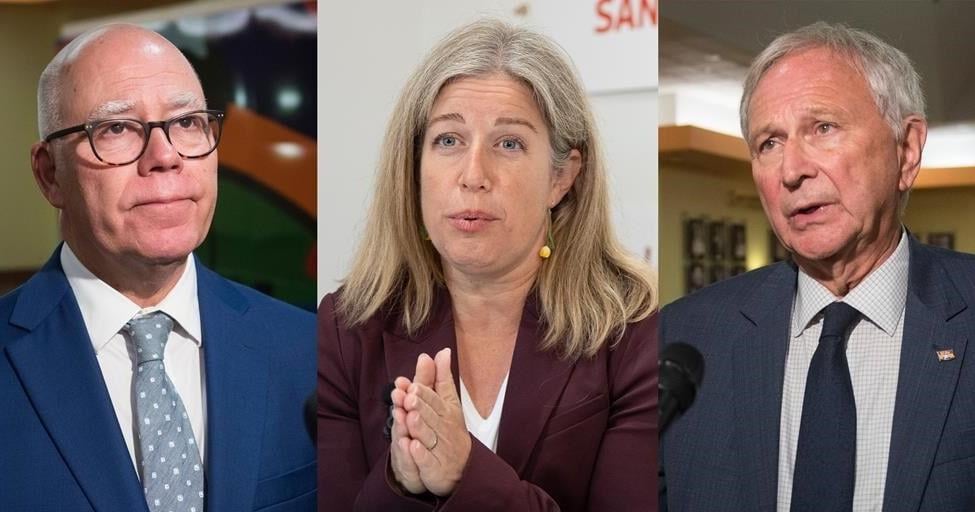
FREDERICTON – New Brunswick voters have elected a Liberal majority government, tossing out the incumbent Progressive Conservatives after six years in power and handing the reins to the first woman ever to lead the province.
Liberal Leader Susan Holt is a relative newcomer to the province’s political scene, having won a byelection last year, eight months after she became the first woman to win the leadership of the party.
The Liberals appeared poised to take 31 of 49 seats to the Conservatives’ 16 and the Greens two.
Holt, 47, led the Liberals to victory after a 33-day campaign, thwarting Blaine Higgs’s bid to secure a third term as Tory premier.
The Liberal win marks a strong repudiation of Higgs’s pronounced shift to more socially conservative policies.
Higgs, meanwhile, lost in his riding of Quispamsis. In a speech to supporters in the riding, he confirmed that he would begin a leadership transition process.
As the Liberals secured their majority, Green Party Leader David Coon thanked his supporters and pledged to continue building the party, but he then turned his sights on the premier. “One thing is for sure,” he told a crowd gathered at Dolan’s Pub in Fredericton, “we know that Blaine Higgs is no longer the premier of this province.”
The election race was largely focused on health care and affordability but was notable for the remarkably dissimilar campaign styles of Holt and Higgs. Holt repeatedly promised to bring a balanced approach to governing, pledging a sharp contrast to Higgs’s “one-man show taking New Brunswick to the far right.”
“We need a government that acts as a partner and not as a dictator from one office in Fredericton,” she said in a recent interview with The Canadian Press.
Higgs focused on the high cost of living, promising to lower the provincial harmonized sales tax by two percentage points to 13 per cent — a pledge that will cost the province about $450 million annually.
Holt spent much of the campaign rolling out proposed fixes for a health-care system racked by a doctor shortage, overcrowded emergency rooms and long wait-times. A former business advocate and public servant, she promised to open 30 community health clinics across the province by 2028; remove the provincial sales tax from electricity bills; overhaul mental health services; and impose a three per cent cap on rent increases by 2025.
The 70-year-old Tory leader, a mechanical engineer and former Irving Oil executive, led a low-key campaign, during which he didn’t have any scheduled public events on at least 10 days — and was absent from the second leaders debate on Oct. 9.
Holt missed only two days of campaigning and submitted a 30-page platform with 100 promises, a far heftier document than the Tories’ two-page platform that includes 11 pledges.
When the election was called on Sept. 19, the Conservatives held 25 seats in the 49-seat legislature. The Liberals held 16 seats, the Green Party had three, there was one Independent and four vacancies. At least 25 seats are needed for a majority.
Higgs was hoping to become the first New Brunswick premier to win three consecutive elections since Liberal Frank McKenna won his third straight majority in 1995. But it was clear from the start that Higgs would have to overcome some big obstacles.
On the first day of the campaign, a national survey showed he had the lowest approval rating of any premier in the country. That same morning, Higgs openly mused about how he was perceived by the public, suggesting people had the wrong idea about who he really is.
“I really wish that people could know me outside of politics,” he said, adding that a sunnier disposition might increase his popularity. “I don’t know whether I’ve got to do comedy hour or I’ve got to smile more.”
Still, Higgs had plenty to boast about, including six consecutive balanced budgets, a significant reduction in the province’s debt, income tax cuts and a booming population.
Higgs’s party was elected to govern in 2018, when the Tories formed the province’s first minority government in almost 100 years. In 2020, he called a snap election — marking the first province to go to the polls during the COVID-19 pandemic — and won a slim majority.
Since then, 14 Tory caucus members have stepped down after clashing with the premier, some of them citing what they described as an authoritarian leadership style and a focus on conservative policies that represented a hard shift to the right.
A caucus revolt erupted last year after Higgs announced changes to the gender identity policy in schools. When several Tory lawmakers voted for an external review of the change, Higgs dropped dissenters from cabinet. A bid by some party members to trigger a leadership review went nowhere.
Higgs has also said a Tory government would reject all new applications for supervised drug-consumption sites, renew a legal challenge against the federal carbon pricing scheme and force people into drug treatment if authorities deem they “pose a threat to themselves or others.”
This report by The Canadian Press was first published Oct. 21, 2024.
-

 Sports16 hours ago
Sports16 hours agoForward Jade Kovacevic is the first player signing announced by Northern Super League
-

 Business13 hours ago
Business13 hours agoWhat Difference Will You Make to an Employer?
-

 News14 hours ago
News14 hours agoSupply shortage for Ontario home care, palliative patients unacceptable: minister
-

 News17 hours ago
News17 hours agoHarris raises $633 million in the third quarter but spends heavily in final push
-

 News14 hours ago
News14 hours agoCarbon monoxide poisoning suspected in deaths of three found in car in Quebec’s Gaspé
-

 Politics3 hours ago
Politics3 hours agoA look at Susan Holt, Liberal premier-designate of New Brunswick
-

 Politics3 hours ago
Politics3 hours agoNew Brunswick Liberals win majority, Susan Holt first woman to lead province
-

 Sports12 hours ago
Sports12 hours agoJays reliever Green and Canadian slugger O’Neill nominated for comeback player award




